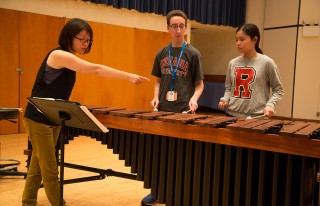Title

Haruka Fujii (Advanced Certificate ’01, percussion) coaches student participants in the 2014 Summer Percussion Seminar.
(Photo by Nan Melville)While things are pretty quiet at Juilliard over the summer, the third floor is about to be buzzing with activity as the Summer Percussion Seminar begins. Over the next two weeks (July 10-23), 17 high school students from 11 states and three countries will take part in one of the most renowned summer programs for young classical percussionists. Led by artistic director Joseph Gramley (MM ’95, percussion), the seminar offers students an unparalleled opportunity to learn from an eclectic roster of some of the most renowned artists from New York and beyond, creating a uniquely Juilliard experience.
Body
Getting into the seminar in the first place requires an audition video with snare drum, mallet, and timpani solos, but for those who are accepted, that’s only the beginning of the hard work. A typical seminar day consists of 12 hours of master classes, rehearsals, workshops, and ear training classes. Students have the opportunity to play for Juilliard faculty members from the New York Philharmonic and the Metropolitan Opera Orchestra as well as international soloists and hand-drumming and world music specialists. In addition to these classes, each student performs in two concerts and attends recitals both at the seminar—this year they will be given by Haruka Fujii (Advanced Certificate ’01, percussion) and me—and elsewhere in Lincoln Center.
With such an intense program, one might ask: what is the motivation for these young percussionists, and what drives them through each long day? When I worked at the seminar last year, I found that most of the participants have the same goal: to get into a competitive college/conservatory program post-high school. Gramley acknowledges this, noting, “The curriculum, the classes, the guest artists, the Juilliard faculty, the facilities, the city—everything is here for students to learn as much as they can about our great and vast world of percussion and what it’s going to take to get them into a school like Juilliard.” And it works. At any given time, Juilliard’s College-Division percussion studio usually has about three or four seminar alumni. Many of those who don’t attend Juilliard end up at other high caliber institutions as well, proving that the seminar is a highly effective training ground for young percussionists.
For me, working at the seminar is more than just coaching chamber music or preparing solo recitals. It also is a chance to connect with young, enthusiastic, and talented minds through a common platform that we all share. Spending over 100 hours with these students gives me an opportunity to learn not just their favorite marimba pieces or drummers but also their individual musical passions. Thus, one of the most important things any student will get out of the seminar is a network of teachers, colleagues, and friends that will only expand as they continue on in their professional development, especially within a percussion community where everybody knows each other. I look forward to the day where I have the privilege of sharing the same stage with students whom I met years back at the Juilliard Summer Percussion Seminar.






